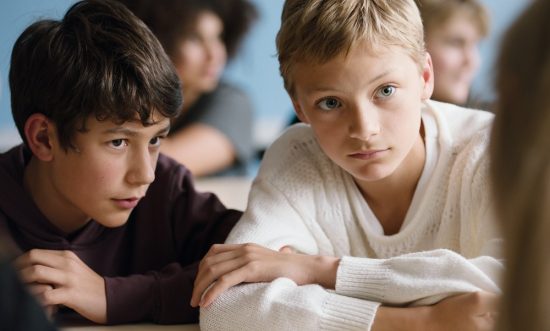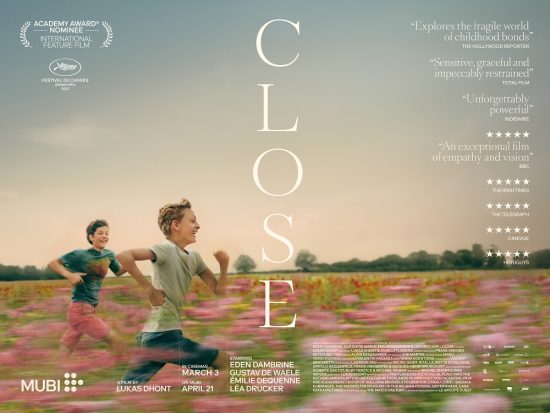Review: Close – “Lukas Dhont tells it with such a delicate touch and mastery of his craft”
It is rare for a film to truly capture the essence of its narrative with the level of cinematic nuance achieved by Belgian filmmaker Lukas Dhont in his emotionally devastating sophomore feature. Winner of the Grand Prix at Cannes, Close is like a tidal wave ready to swallow you whole, and you’ve got to brace yourself for dear life cause there’s no chance in hell you’ll make it to the rolling credits unscathed.
Dhont’s striking debut, Girl (2018), undoubtedly introduced him as an exciting new voice in world cinema, despite the controversy around some choices made in portraying a transgender teen’s dramatic journey of self-affirmation. With this follow-up, the filmmaker continues to tread the beloved coming-of-age territory and although one may argue that all has been said and done before, trust me, here the beauty lies in the execution, which echoes Truffaut and the golden years of Gus Van Sant.
Léo (Eden Dambrine) and Rémi (Gustav De Waele) are the epitome of BFFs, literally the kind of friends who share the air they breathe. When we first meet these two 13-year-old boys in the film’s opening, they are playing outdoors in the rural Belgian town they live in, pretending to wait out some sort of siege that culminates into a mad running race through the fields on a gorgeous sunny day of summer. It’s an idyllic sequence encapsulating the boys’ innocence and establishing their strong bond as Léo practically sleeps over at Rémi’s every night and wilfully neglects helping his family with the flower harvest on their farm.
Seasonal transitions have both a symbolic and structural value to the story as autumn’s arrival means the boys are starting high school, an experience bound to alter the dynamics of this seemingly bomb-proof friendship. All it takes is a question by some girls at school: “are you together?” as in “are you a couple?”, to which Léo promptly replies with a firm and equally nervous denial, claiming they’re so close as if they were practically brothers.
This awkward and tense moment marks the beginning of the end for the boys’ special relationship, which is never openly hinted at as anything more than just friendship. This is not only because the kids are still on the cusp between childhood and adolescence but because the filmmakers are interested in exploring the pitfalls of male relationships at such a formative age rather than explicitly tell another tale of LGBT bullying.
The focus here is to analyse how societal pressure to adhere to certain standards of toxic masculinity has practically led to an inevitable and extremely worrying mental health crisis where boys showing a sensitive side are immediately pegged as effeminate or gay. Whilst writing the film, Dhont has found a source of inspiration and scientific insight in Dr. Niobe Way’s book called “Deep Secrets: Boys’ friendships and the crisis of connection”, drawn from hundreds of interviews with adolescent boys of various backgrounds.
Although Close isn’t a documentary, the peaks of cinema verité reached by the director and his co-writer Angelo Tijssens are remarkable and achieve another level of sublime courtesy of the incredible performances by newcomers Eden Dambrine and Gustav De Waele. It is astounding to witness their ability to emote in such a restrained and understated way, which is a testament to the filmmakers’ craft as much as to the youngsters’ innate talent. Nothing can prepare you for the break-up of this beautiful friendship and the harsh consequences that follow.
The young actors excel at making us fall in love with their extremely believable tender rapport in the film’s first act so much that when Léo pulls away from Rémi to avoid social isolation we can genuinely feel for both and understand their behaviours. Léo joins some of the new classmates in the hockey team despite not looking exactly cut out for it, whilst Rémi eventually reacts to his best buddy’s withdrawal with a violent confrontation.
Delving any further in the already sparse plot would do a disservice to the viewing experience but you must be aware that this is a rather heart-breaking story, which may upset some viewers. Dhont, however, tells it with such a delicate touch and mastery of his craft in every department that the pain we feel as an audience is rewarded by the poetry of his visuals and the powerful message behind it. After all, to quote the doctor consoling a sobbing Léo who fell on the ice rink during a match: “a broken arm is always going to hurt”.
Close is in UK cinemas from March 3rd and streaming on MUBI from April 21st.












